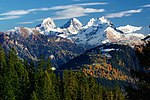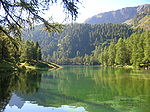The Albula Tunnel is the centrepiece of the Albula Railway, which forms part of the Rhaetian Railway network, in the Canton of Graubünden, Switzerland. With its maximum elevation of 1,820 m (5,970 ft) above sea level, it is amongst the highest tunnels in the Alps, and has a mountain overlay of up to 950 m (3,120 ft). The tunnel has a length of 5,865 m (19,242 ft). It opened for traffic in 1903.The northern portal of the tunnel is at Preda, in Bergün, and the southern portal at Spinas, in the Bever valley. At a total length of 5,865 m (19,242 ft), the tunnel connects the Albula Valley with the Engadin Valley, and, in so doing, passes under the watershed between the Rhine and the Danube a few kilometres west of the Albula Pass. The tunnel serves both passenger and freight traffic. The Glacier Express passes through it daily. During the winter season, car transporter trains operating between Thusis and Samedan also used the tunnel until 2011.
Due to the threat of rockfalls and general deterioration over time, it was planned for the original tunnel to have been renovated during the 2020s. But in 2010, the Rhaetian Railway announced that it had identified the construction of a second tunnel alongside the first as its preferred option, with one of several reasons being a relatively minor difference in cost. Costed at around CHF 244 million, construction commenced during 2014. In comparison to the original Albula Tunnel, the new bore is considerably larger due to newer operational and safety standards. The second tunnel is set to be opened to traffic in 2024, with completion of the project including refurbishment of the original tunnel by 2025. Once completed, around 15,000 trains are predicted to use the tunnel each year; it has been built to allow for a maximum speed of 120 km/h.












